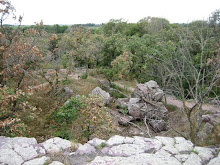Laura Ingalls Wilder, Elijah, and Text
Last Friday my sisters took my two youngest children and me to De Smet to see the Ingalls' homestead. What a minimalist experience! It was surprisingly engaging. I loved the five cottonwood trees, the last of thousands planted by Laura's father.
I want to talk about Laura not historically but literarily; not as a fronteir experience, but as a textual experience. I hope to avoid dichotomies, and beg forgiveness if I oversimplify anything.
The speaker in Seamus Heaney's poem, "Digging," lauds his relatives who are good with spades for cutting "turf" and planting potatoes, and concludes, referring to his poet's pen, that "I'll dig with this." There are different ways to work the land.
Laura's parents gave the family a real (as in terms of real property) inheritence; she gave her parents a type of inheritence, a mortal immortality, by writing about the family land experience. The land is still there; the story is there, too--they give to each other.
Maybe the biblical idea that "children are an heritage of the Lord" comes through in such cases--children both receive the inheritance and ARE the inheritance--a sort of back flow. Have you seen in rapids how some currents go downstream and some go up, it seems? Maybe the conflict of generations is really the fact that energy goes two ways--we just don't give to our children (good and bad, pleasing and painful, counsel and knowledge); they give to us.
Finally, Laura. Her life is a life, and became literary because she crafted it in text. It was not necessarily an amazing life that gauranteed a good story; it was a good story that made the life of interest to others. A life is not important because it is well-known, but the fact that sincerely writing about an authentic experience created an awareness and recognition of her life and lives like hers is a remarkable thing; even in autobiographical fictions we sense the turning of the hearts of the children to their fathers, and there is a chariot of fire driving the whole experience.
Text gives meaning to life, life gives meaning to text--in the reading and the writing.
I want to talk about Laura not historically but literarily; not as a fronteir experience, but as a textual experience. I hope to avoid dichotomies, and beg forgiveness if I oversimplify anything.
The speaker in Seamus Heaney's poem, "Digging," lauds his relatives who are good with spades for cutting "turf" and planting potatoes, and concludes, referring to his poet's pen, that "I'll dig with this." There are different ways to work the land.
Laura's parents gave the family a real (as in terms of real property) inheritence; she gave her parents a type of inheritence, a mortal immortality, by writing about the family land experience. The land is still there; the story is there, too--they give to each other.
Maybe the biblical idea that "children are an heritage of the Lord" comes through in such cases--children both receive the inheritance and ARE the inheritance--a sort of back flow. Have you seen in rapids how some currents go downstream and some go up, it seems? Maybe the conflict of generations is really the fact that energy goes two ways--we just don't give to our children (good and bad, pleasing and painful, counsel and knowledge); they give to us.
Finally, Laura. Her life is a life, and became literary because she crafted it in text. It was not necessarily an amazing life that gauranteed a good story; it was a good story that made the life of interest to others. A life is not important because it is well-known, but the fact that sincerely writing about an authentic experience created an awareness and recognition of her life and lives like hers is a remarkable thing; even in autobiographical fictions we sense the turning of the hearts of the children to their fathers, and there is a chariot of fire driving the whole experience.
Text gives meaning to life, life gives meaning to text--in the reading and the writing.


2 Comments:
1. Charles Ingalls, Laura's father, did have a son (who died in infancy).
2. The male v. female frontier experience is a false construction, for even Laura's sister and sister-in-law homesteaded, as did many single women of her time. Your assumptions about such experiences are rather narrow.
I received an anonymous comment on my original entry this morning, justly critiquing my oversimplified fronteir-and-gender comments. I have revised the posting and hope it shows improved thought, spirit, and expression. Please comment again, Anonymous.
Post a Comment
Subscribe to Post Comments [Atom]
<< Home